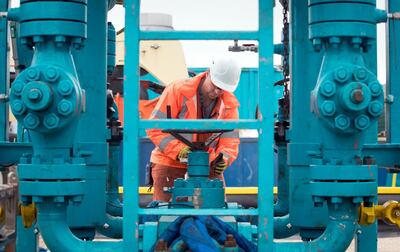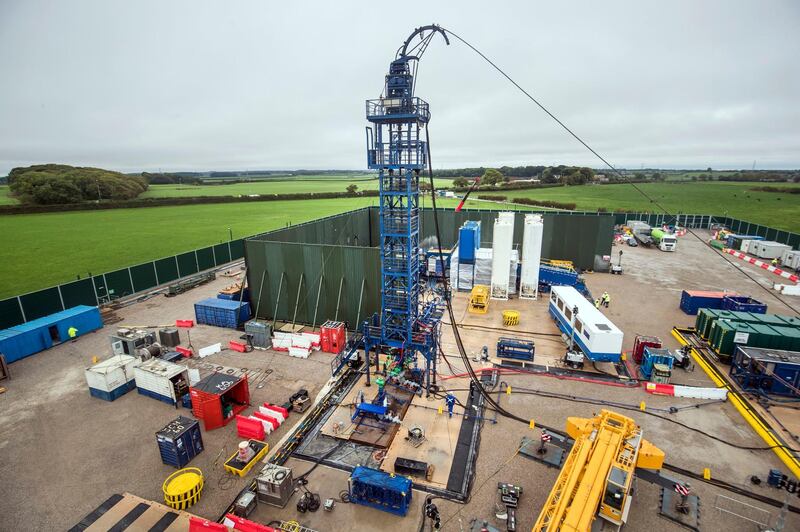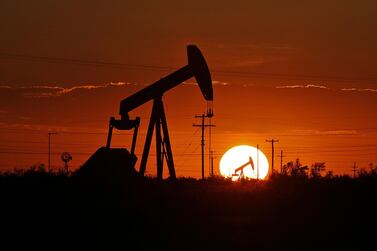A change of British government has given the much maligned fracking industry another opportunity to make out its case for stimulating the controversial technique to tap unconventional natural gas reserves.
Prime Minister Boris Johnson and his new business minister, Andrea Leadsom, have come out in favour of hydraulic fracturing in the past. That could provide impetus for an industry that has all but ground to a halt thanks to strict regulatory limits on the seismic activity around fracking wells.
As Cuadrilla Resources resumed work at a site in Lancashire, the Department for Business, Energy & Industrial Strategy said last week that it saw shale gas as a crucial domestic energy source that can cut gas imports as well as working as a bridging fuel to get to net zero emissions by 2050. That may indicate the government could loosen rules that have hobbled the industry.
“For our industry in particular, we do need a review” of seismic limits, said Ken Cronin, chief executive of the UK Onshore Oil and Gas body.
Some sort of change is necessary to keep fracking alive. Cuadrilla has until November 30 to work at its Preston Road site. After that, planning permission expires and only flow tests of existing boreholes are possible. The firm has applied to Lancashire County Council for an 18-month extension, but a decision on that is unlikely before summer 2020, a spokeswoman said.
Fracking involves pumping water and tiny particles into underground rock formations under high pressure, opening cavities to allow gas to flow into the wellbore. The technique can cause tremors in the earth, although most are so minor only scientific instruments can detect them.
In Britain, rules restrict fracking to operations that have underground seismic activity of below 0.5 on the Richter Scale. That’s a fraction of what’s allowed in Texas and Oklahoma where fracking has revolutionised the oil industry.
“We were stymied by the 0.5, and we think that there is good scientific evidence out there to increase that level,” Mr Cronin said.

It’s one of the few technologies that could slow or even reverse the sharp declines in oil and gas production from the North Sea as conventional deposits run dry. Exploration has been halted a number of times over concerns about earthquakes caused by fracking, most of them too small for people to notice.
By comparison, a passing truck produces a magnitude-3 quake on the Richter Scale, according to Bloomberg Intelligence. Cuadrilla Resources had stopped its UK fracking operations in October, following a series of mini-seismic events at its site in Lancashire, north-west England.
After years of delays, fracking in the UK seemed closer than ever when Cuadrilla Resources said in February that the nation’s first horizontal fracking well had uncovered a large reservoir of high-quality fuel.
But that optimism however was short-lived as Cuadrilla blamed overzealous controls on seismic activity that prevent it from being able to fully tap the potential of the well. Both it and Jim Ratcliffe-owned Ineos Group, have said that unless the government loosens regulations they won’t be able to frack in the UK.
Cuadrilla chief executive Francis Egan said that government policy to explore and develop shale-gas “has not changed”. He said he took encouragement by government climate advisers, the Climate Change Committee, recognising natural gas as an essential energy for the UK’s net-zero commitment.
"Give the British people their mineral rights, and get fracking at last," Mr Johnson wrote in the Telegraph in 2014. As Mayor of London, he told the Times newspaper that the city "should leave no stone unturned, or unfracked, in the cause of keeping the lights on".
Ms Leadsom wrote in the Yorkshire Post in 2016 that "a shale gas industry will not only boost our economy and create thousands of jobs across the supply chain it will help to guarantee a secure energy supply which is an absolute must for this government".
Despite apparent support at ministerial level, dozens of lpolicymakers in the Conservative Party oppose the practice partly on environmental grounds and partly because of the threat dozens of wells would have to the countryside.
So far, the government hasn’t committed to changing the rules. Last week it restated its enthusiasm for fracking without saying how it would balance the environment concerns.
“Shale gas could be an important new domestic energy source reducing the level of gas imports while delivering broad economic benefits, including through the creation of well-paid, quality jobs,” the business department said in a statement. “It could also support our transition to net zero emissions by 2050.”
Opposition parties point out fracking and producing more gas isn’t compatible with goals to rein in fossil fuel emissions and climate change.
“There is no way we can reach net zero by 2050 if we fully exploit the UK’s shale gas reserve,” said Rebecca Long-Bailey, the member of Parliament who speaks for the Labour opposition on business. “Simply put, there is no room left for fracking and it should be banned immediately.”
The practice has come under fire from environmental campaigners concerned about the affect it has on rock structures and water systems as well as the emissions. Protesters have consistently disrupted prospective shale gas sites up and down the UK and have taken the issue to court to have it stopped.
In a new study from Cornell University, globally the industry is found to be behind rising greenhouse-gas emissions, according to Robert Howarth. The process contributes more methane than cows and wetlands. The gas has global-warming potential, 84 times greater than carbon dioxide across a 20-year period.
“The industry seems to have struggled to convince the British public that developing a new fossil fuel resource is an environmentally responsible thing to do,” Laurence Williams, a research fellow in environmental politics at the University of Sussex, said last week.
The argument that shale gas can work as a transition fuel “had only limited success in persuading environmentally minded people to support fracking”, said Mr Williams. “And it struggles to compete with the simplicity and clarity of a phrase like ‘keep it in the ground.’”







